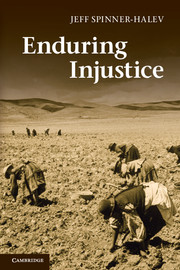4 - Apology and acknowledgement
Published online by Cambridge University Press: 05 June 2012
Summary
Accompanying the argument for remedying historical injustice are arguments for apologizing for these injustices. We are in, one book proclaims, “The Age of Apology.” Indeed, official apologies are proliferating. I mentioned a few apologies in Chapter 1, but there are more. The universities of Virginia and Alabama apologized for using slave labor earlier in their history; the Paris Bar apologized to Jewish and foreign lawyers who were disbarred in Vichy France; a French doctor's organization made a similar apology, as did one French police union (though another objected); by one count Pope John Paul II apologized over one hundred times for past injustices committed by the church. The US Senate apologized in 2005 for failing to enact anti-lynching legislation earlier in the century. In 2009 the California Parliament apologized for laws that discriminated against Chinese Americans in the nineteenth and up to the middle of the twentieth centuries. The list goes on, as government apologies have become increasingly common.
Most arguments advocating apology maintain that if the dominant community apologizes to victims of past (and sometimes current) injustices, all will be well – or at least we will be on the road toward transformation and healing. These arguments are another version of the exceptions to progress view I examined in Chapter 2; apologies are given for the exceptions, with the expectation that the apology will then usher in an era where the exception is no longer. Most of the arguments for apologies are for what I call enduring injustices, though this is rarely if ever stated. Politicians sometimes slip in apologies for past injustices – like the apology to Chinese Americans for discrimination that they or their ancestors faced – but these apologies are rarely noticed. In the cases of enduring injustice, apologies are often thought to restore justice, though what that means exactly is vague. Apology advocates impute considerable power to apologies, but I cast doubt on their power in this chapter. One important problem with the arguments for apologies is that they do not present a theory of apology. As Michael Freeman notes: “Apologies seem theory free.” A theory of apology would help us to determine when apologies are appropriate, and here apology advocates share a problem with those who want to repair historical injustice: for which past misdeeds should democratic governments apologize today?
- Type
- Chapter
- Information
- Enduring Injustice , pp. 85 - 119Publisher: Cambridge University PressPrint publication year: 2012



